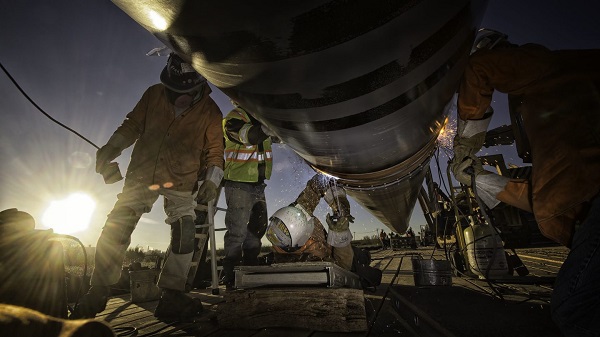Alberta
Your money isn’t as safe as you think

This article supplied by Troy Media.
The Emergencies Act proved how quickly bank accounts can be weaponized. Alberta must act now to protect its citizens.
When Eva Chipiuk (the Alberta lawyer who famously confronted former Prime Minister Justin Trudeau’s assertions at the Emergencies Act inquiry) found out her Royal Bank account was being shut down, it confirmed a chilling truth: those who challenge Ottawa are not safe from retribution.
Chipiuk committed no crime and was not charged with any offence. However, the Montreal-based Royal Bank refused to provide her services, citing an unspecified risk. The message is clear: if you challenge Ottawa, you may risk being treated as an economic non-person. This comes just months before Tamara Lich, an Alberta resident, is expected to be sentenced for standing up against COVID overreach.
The Alberta government cannot ignore these threats against its citizens. There is plenty Ottawa doesn’t like about Alberta and Albertans today. Given that, in a February 2022 Globe and Mail oped—written before he became prime minister—Mark Carney described civil protesters as “seditionists,” one doesn’t need much imagination to see how his government could treat Albertans who push for greater control over their future. The province must prepare now to shield its citizens from financial retaliation.
Albertans who think their money is safe if it’s parked at a credit union or ATB, instead of a chartered bank, are mistaken. It isn’t. Under the Criminal Code, the Proceeds of Crime (Money Laundering) and Terrorist Financing Act, and the Emergencies Act, Ottawa can force any “financial service provider”—including provincially regulated credit unions—to freeze accounts. For example, when Tamara Lich tried to open an account with ATB—Alberta’s Crown-owned financial institution—she was denied even an appointment.
Events such as these show that it doesn’t take a judge to determine you have run afoul of those laws—only a government that disagrees with you.
Alberta has the tools to defend its citizens, and it should use them. It should start by making ATB and its provincially regulated credit unions fortresses against politically motivated financial punishment. ATB, created in 1938 to shield farmers from the aggressive lending practices of Laurentian bankers, has a distinct status as an arm of the Alberta government.
That status can be leveraged today to keep Ottawa at bay by:
- Refocusing ATB on serving Albertans, not advancing trendy corporate agendas.
- Amending the ATB Financial Act to require judicial orders for any account freezes or closures, mandate public reporting of such actions, and enshrine political neutrality to ensure no Albertan is denied service for lawful political activity.
- Preparing to invoke the Sovereignty Act if Ottawa attempts another Emergencies Act-style move, instructing ATB and its credit unions to disregard unconstitutional federal orders unless validated by Alberta courts.
- Creating a Québec-style integrated financial regulator to oversee ATB and Alberta’s provincially regulated credit unions, insulating them from Ottawa’s reach.
- Exploring alternative payment systems to reduce reliance on Ottawa-controlled clearing mechanisms. Payments Canada—which Ottawa controls—could be used as a choke point against Alberta institutions. A provincial or private settlement system would blunt that weapon before it can be deployed.
Finally, Alberta should enact an Alberta Financial Rights Act guaranteeing that no one will be denied financial services and that no account can be frozen or closed without due process in open court.
Ottawa will not take this lying down. It can seek court injunctions, threaten ATB’s and our credit unions’ access to national payment systems, or pass legislation directly targeting provincial Crown corporations. Alberta must anticipate these moves now by drafting constitutional challenges, forging alliances with like-minded provinces, and building backup clearing systems.
When the federal government can freeze your account for giving $50 to the “wrong” cause, you are not a free citizen. You are a subject. The treatment of Tamara Lich and Eva Chipiuk’s debanking is a warning.
Alberta can either wait for the next wave of financial punishments to hit its citizens, or it can act decisively to make ATB and its provincially regulated credit unions fortresses that protect them. Premier Danielle Smith has a unique opportunity to put Alberta first again—and she should take it.
Marco Navarro-Genie is vice-president of research at the Frontier Centre for Public Policy and co-author, with Barry Cooper, of Canada’s COVID: The Story of a Pandemic Moral Panic (2023).
Troy Media empowers Canadian community news outlets by providing independent, insightful analysis and commentary. Our mission is to support local media in helping Canadians stay informed and engaged by delivering reliable content that strengthens community connections and deepens understanding across the country.
Alberta
Sheriffs shut down Olds drug house

News release from the Province of Alberta
The Alberta Sheriffs have shut down a problem property where suspected drug activity threatened nearby playgrounds and other community spaces.
The Safer Communities and Neighbourhoods (SCAN) unit of the Alberta Sheriffs obtained a court order against the property owner of 5222 42 Street. The property will be closed for 90 days, beginning on Oct. 7 at noon. All individuals must vacate the premises, including the property owner.
The community safety order, obtained in the Court of King’s Bench, bars all people from the property until the closure period ends on Jan. 5, 2026, and prohibits certain individuals from accessing the property altogether, while the order is in place. The property will be boarded up, fenced and all the locks will be changed. SCAN members will continue to monitor the property for activity while their investigation remains ongoing. Community safety order conditions remain in effect until Jan. 5, 2028.
“SCAN now adds Olds to the long and growing list of Alberta communities that have benefited from its diligent investigative work. My thanks to members of the southern SCAN unit and the RCMP for the closure of another disruptive problem property that posed a risk to nearby playgrounds and the surrounding community and threatened public safety. Criminal activity has no home in our province. I encourage all Albertans to report suspicious activity where and when they see it.”
“Close collaboration with local police was essential for a successful investigation of this property and I thank the Olds RCMP for its partnership on this file. Residents are relieved to see this property close, putting an end to the illegal activities centred around it. Here and across Alberta, SCAN is dedicated to maintaining the peace and safety of neighbourhoods and communities.”
“Olds RCMP remains fully committed to building safer communities by working in partnership with our community as well as through investigative and enforcement efforts to achieve this goal. Olds RCMP would like to thank the Olds RCMP crime reduction member on conducting an excellent investigation and the Alberta Sheriffs SCAN unit for its assistance during this project.”
The Alberta Sheriffs work with other law enforcement agencies to shut down properties being used for illegal activities. The SCAN unit operates under the Safer Communities and Neighbourhoods Act, which uses legal sanctions and court orders to hold owners accountable for illegal activity happening on their property.
Since its inception in 2008, Alberta’s SCAN unit has investigated more than 10,000 properties and has issued more than 135 community safety orders. Most complaints are resolved by working with owners to stop the illegal activity on their property.
Quick facts
- Between February 2022 and May 2025, the RCMP attended the property 65 times for various types of calls for service.
- The RCMP executed three search warrants between January 2024 and April 2025, during which stolen property, illegal drugs and drug paraphernalia were recovered.
- SCAN investigators and the RCMP continued to receive complaints of suspected drug and criminal activities at the property throughout the course of their investigation and observed activity consistent with drug dealing.
Alberta
‘Visionary’ Yellowhead Pipeline poised to launch Alberta into the future

From the Canadian Energy Centre
Heartland leaders welcome proposed new natural gas connector
As a lifelong farmer, entrepreneur and community leader, Alanna Hnatiw knows first-hand the crucial role energy plays in a strong and diverse economy.
The mayor of Sturgeon County, a sprawling rural municipality northeast of Edmonton, Hnatiw has spent much of the last decade working to protect its agricultural roots while building new industries that support the jobs and services families and businesses rely on every day.
Hnatiw says there is widespread appreciation among the county’s 20,000 residents for the opportunities afforded by the province’s oil and gas resources. That’s why she joined other leaders in Alberta’s Industrial Heartland region to applaud a major new natural gas pipeline planned for the area.
“Natural gas is an integral to all the industrial operations in Sturgeon County and the surrounding area. It goes beyond just burning it to turn turbines, it is the feedstock for all kinds of value-added processing. From fertilizer and plastics to petrochemicals and hydrogen, natural gas is the lynchpin for us into the future,” she said.
Filling growing demand
Hnatiw is one of more than a dozen community and industry leaders who sent letters of support to the Alberta Utilities Commission (AUC) last year endorsing ATCO Energy Systems’ proposed Yellowhead Pipeline project.
The project achieved a significant milestone in August when the AUC approved ATCO’s application determining the pipeline is needed.
The largest infrastructure investment in the company’s history, the 230-kilometre pipeline from Peers to Fort Saskatchewan will transport more than 1.1 billion cubic feet of natural gas per day when operational in late 2027.
For context, Alberta produced about 11 billion cubic feet per day of natural gas in 2024, according to the Alberta Energy Regulator.
The Yellowhead Pipeline will boost deliveries to the greater Edmonton area as demand continues to grow for power generation, manufacturing, petrochemical processing and residential use.
Industrial customers have reserved 90 per cent of the pipeline’s capacity to meet their future needs.
This includes Dow Chemical, which plans to build an $8.9-billion net-zero ethylene processing facility in Fort Saskatchewan, Heidelberg Materials’ Edmonton facility that aims to be the world’s first full-scale cement plant equipped with carbon capture and storage (CCS), and McCain Foods, which requires more natural gas for a planned expansion of its French fry factory in Coaldale.
Prosperity driver
Edmonton Global CEO Malcolm Bruce described the Yellowhead Pipeline as a “visionary” infrastructure project in his letter of support to the AUC.
“The [project] will create jobs, enable billions in new investment and drive Alberta’s hydrogen roadmap and natural gas vision and strategy.”
ATCO’s projections show the pipeline will generate substantial economic benefits. The company estimates that during construction, it will support 12,000 jobs and contribute $1.6 billion per year to Alberta’s economy.
Once in operation, the pipeline is expected to support 23,700 jobs per year and add $3.9 billion annually to Alberta’s GDP.
For Sturgeon County, the project also provides much-needed certainty that natural gas will be available for the $30 billion in new industrial investments the region is hoping to attract in the coming years.
Future plans
The municipality is already home to major operations including the NWR Sturgeon Refinery and Nutrien fertilizer plant, both of which capture carbon dioxide emissions that are transported through the Alberta Carbon Trunk Line for deep underground storage near Clive, Alberta.
Hnatiw said future development may include hydrogen production with CCS, petrochemical processing, gas-fired power plants and large-scale data centres.
“With our operations running near capacity right now, this new pipeline helps alleviate the uncertainty around gas supplies for industrial developers,” Hnatiw said.
The county’s industrial goals are inextricably tied to ensuring its farming sector continues to flourish, she said.
“Eighty per cent of our land base is agricultural, but it only accounts for one per cent of our budget as far as taxes go, so we need our industrial residents to support our rural way of life,” she said.
“We don’t want people to have to leave our community to make a living. We want a future that is full of opportunity, and one that is also sustainable for the families that produce our food, our fuel, and all the other value-added products we can provide.”
ATCO’s next step is to file for AUC approval to build the pipeline later this year. The company expects construction to begin in 2026.
-

 Opinion2 days ago
Opinion2 days agoJordan Peterson needs prayers as he battles serious health issues, daughter Mikhaila says
-

 COVID-191 day ago
COVID-191 day agoFreedom Convoy Sentencing: Lich and Barber escape prison terms but will spend months in house arrest
-

 Alberta1 day ago
Alberta1 day ago‘Visionary’ Yellowhead Pipeline poised to launch Alberta into the future
-

 COVID-191 day ago
COVID-191 day agoChris Barber will not see prison time for his role in peaceful Freedom Convoy
-

 Immigration2 days ago
Immigration2 days agoConservatives blame Liberals for allowing man on UK child sex offender list to enter Canada
-

 COVID-1919 hours ago
COVID-1919 hours agoDevastating COVID-19 Vaccine Side Effect Confirmed by New Data: Study
-

 espionage2 days ago
espionage2 days agoCanada’s federal election in April saw ‘small scale’ foreign meddling: gov’t watchdog
-

 Crime1 day ago
Crime1 day agoCanadian Sovereignty at Stake: Stunning Testimony at Security Hearing in Ottawa from Sam Cooper







